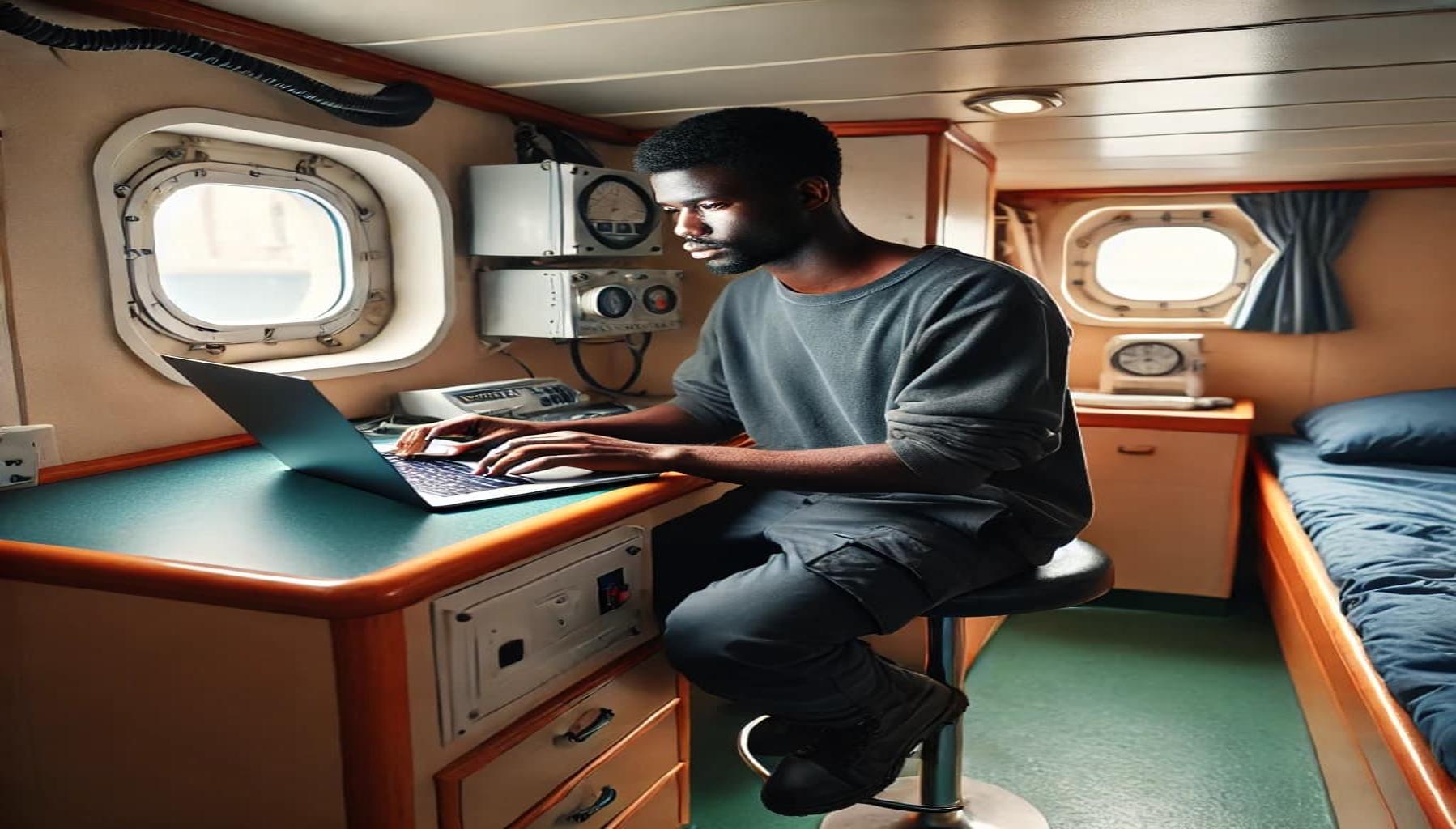How to be a Good Leader When You Work in a Job at Sea

Leadership at sea requires a unique blend of skills, resilience, and adaptability. Working in a maritime job aboard a commercial vessel, whether that’s a cargo ship, tanker, bulk carrier or cruise ship, as a seafarer, you face distinctive challenges, from long periods away from home to the unpredictability of the weather and marine environment.
Whether you’re an experienced officer looking to refine your leadership abilities or a young seafarer aspiring to advance, becoming a good leader at sea is essential for the safety, efficiency, and morale of the crew.
Here, we’ll explore key strategies and practices that can help you become a strong and effective leader in the maritime industry.
Understand your role as a leader
At sea, a leader's responsibilities go beyond issuing orders and ensuring tasks are completed. A good leader working in a seafarer job:
- Promotes safety as a top priority.
- Builds a cohesive team.
- Leads by example in following regulations and best practices.
- Serves as a mentor and guide to less experienced crew members.
Understanding that leadership is about service and responsibility, rather than authority alone, sets the foundation for building trust and respect among your fellow crew.

Communicate effectively
Clear and consistent communication is the cornerstone of effective leadership when working on a ship. Miscommunication can lead to errors, accidents, and misunderstandings, all of which are particularly dangerous in the maritime environment.
Tips for better communication:
- Be concise and clear: Avoid ambiguity in instructions, especially during critical operations like cargo handling or navigation.
- Encourage feedback: Foster an environment where crew members feel comfortable asking questions or expressing concerns.
- Use standardized language: Follow established maritime protocols for communication, such as the IMO Standard Marine Communication Phrases (SMCP).
- Adapt your style: Different crew members may respond better to different approaches. Be mindful of cultural and linguistic differences on board.
Good communication builds trust, enhances teamwork, and ensures that everyone is aligned with the vessel’s operational goals.
Read more: Communication Strategies When You Work in a Job at Sea
Prioritize safety and lead by example
Safety is the most critical aspect of leadership at sea. In maritime jobs, a good leader not only enforces safety protocols but also models safe behavior at all times.
How to lead on safety:
- Know the procedures: Be well-versed in all safety protocols, emergency response plans, and maritime regulations.
- Participate in drills: Actively engage in safety drills and encourage crewmates to take them seriously.
- Address risks proactively: Regularly inspect equipment and operations to identify and mitigate potential hazards.
- Demonstrate vigilance: Wear proper personal protective equipment (PPE) and follow safety rules to set a positive example.
When a leader prioritizes safety, it creates a culture where every crew member feels responsible for maintaining a secure working environment aboard their ship.

Build strong relationships with your crew
A cohesive and motivated crew is vital for the smooth operation of any vessel. Strong leaders working in jobs at sea build trust and camaraderie among their team by showing genuine care and respect for their wellbeing.
Ways to strengthen relationships:
- Be approachable: Make yourself accessible to your crew and show a willingness to listen to their concerns.
- Show empathy: Understand the challenges of life at sea, such as homesickness and fatigue, and offer support when needed.
- Recognize contributions: Acknowledge and celebrate individual and department accomplishments to boost morale.
- Foster teamwork: Encourage collaboration and mutual support among crew members.
Good relationships create a positive onboard atmosphere, reducing conflicts and improving overall job satisfaction - things that are all crucial when working in a seafarer job.
Read more:5 Ways to Improve Life Onboard by Being a Better Crewmate
Be decisive and stay calm under pressure
Working on a cargo ship or other commercial vessel often involves high-pressure situations, from navigating through storms to handling onboard emergencies. A good leader must remain calm and make sound decisions, even in stressful conditions. And if you find yourself panicking when it comes to making choices, don’t - because there are ways to develop a more decisive mindset.
How to develop decisiveness:
- Stay informed: Continuously educate yourself about maritime operations, safety procedures, and industry trends.
- Assess situations quickly: Evaluate risks and potential outcomes before taking action.
- Trust your training: Rely on your knowledge and experience to guide your decisions.
- Stay composed: Avoid panic, as your demeanor will set the tone for the rest of the crew.
Decisive and composed leadership when working in a job at sea inspires confidence and ensures swift, effective responses to challenges.

Invest in your own development
Good leaders are lifelong learners. The maritime industry is constantly evolving, and staying up-to-date with new technologies, regulations, and leadership techniques is crucial.
Steps to continuous improvement:
- Pursue advanced certifications: Enroll in leadership, safety, and technical courses to enhance your qualifications.
- Learn from mentors: Seek advice and insights from senior officers or industry veterans.
- Read and study: Stay informed through books, articles, and online resources about leadership and maritime jobs and topics.
- Embrace feedback: Use constructive criticism from your crew or superiors as an opportunity to grow.
A commitment to self-improvement not only benefits you but also sets an example for the crew to strive for excellence.
Adapt to cultural diversity
Working on a cargo ship often means working with a multinational crew, with members from diverse cultural and linguistic backgrounds. Good leaders embrace this diversity and foster a culture of inclusion and respect.
Tips for managing a diverse crew:
- Learn about cultures: Take time to understand the cultural norms and traditions of your fellow crew members.
- Promote inclusivity: Ensure everyone feels valued and included, regardless of their background.
- Adapt communication styles:Be mindful of language barriers and use clear, simple language when needed.
- Encourage mutual respect: Foster an environment where crew members appreciate and respect each other’s differences.
By embracing diversity, you can build a stronger, more unified team.

Read more:Why It's Important to Get Along with Your Fellow Crew
Mentor and empower your crew
In a maritime job, a good leader helps others grow by mentoring them and providing opportunities to develop their skills. Empowering your crew boosts their confidence and prepares them for future leadership roles.
How to mentor effectively:
- Share knowledge: Pass on your experience and insights to junior crew members.
- Encourage initiative: Allow crew members to take on new responsibilities under your guidance.
- Provide constructive feedback: Offer guidance that helps individuals improve without discouraging them.
- Support maritime career growth: Help crew members identify opportunities for advancement and encourage them to pursue training and certifications.
Mentorship not only strengthens the capabilities of your crew but also leaves a lasting legacy of strong leaders within the maritime industry.
Manage stress and maintain wellbeing
Leadership at sea can be demanding, and maintaining your physical and mental health is essential to perform in a job at sea effectively.
Tips for managing stress:
- Set boundaries: Balance your workload and ensure you take time to rest.
- Practice self-care: Eat nutritious meals, stay hydrated, and engage in regular physical activity.
- Stay connected: Keep in touch with family and friends during your time at sea to maintain emotional wellbeing.
- Seek support: If you’re feeling overwhelmed, reach out to colleagues or professional resources for help, such as The Mission to Seafarers.
A healthy leader is better equipped to handle challenges and support their crew.

Read more: How to Cope with Stress When Working in a Seafarer Job
Lead with integrity
Integrity is the foundation of good leadership when working in a seafarer job. A leader who is honest, fair, and accountable earns the trust and respect of their crew.
Ways to demonstrate integrity:
- Be transparent: Communicate openly and honestly with other crew members.
- Take responsibility: Own up to mistakes and learn from them.
- Be consistent: Treat all crew members fairly and adhere to the rules you enforce.
- Uphold ethical standards: Always act in the best interest of the crew, the vessel, and the maritime industry.
Leading with integrity creates a positive work culture and ensures long-term success.
Are you ready to step up and be a good leader?
Being a good leader when you work in a job at sea requires a combination of technical expertise, interpersonal skills, and a commitment to continuous improvement.
By fostering strong communication, prioritizing safety, building relationships, and leading with integrity, you can inspire your crew to perform at their best and create a harmonious onboard environment.
Whether you’re a seasoned officer or an ambitious cadet, these principles should guide you in your journey to becoming a respected and effective leader in the maritime industry, whether you’re working on a cargo ship or you’ve made the transition to a shore-based maritime career.

Find your next maritime job with Martide
Meanwhile, if you’re looking for your next maritime job, take a look at Martide’s current seafarer job vacancies. Our partners are looking for all different ranks and levels of experience, whether you’re a born leader or someone who is looking to learn the ropes.

Eve Church
Eve is Martide's content writer, publishing regular posts on everything from our maritime recruitment and crew planning software to life at sea. Eve has been writing professionally for more than two decades, crafting everything from SEO-focused blog posts and website landing pages to magazine articles and corporate whitepapers.
UK



